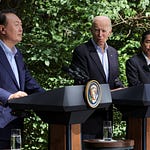Larry Bernstein
Welcome to What Happens Next. My name is Larry Bernstein.
What Happens Next is a podcast which covers economics, finance, history, politics and current events. Today’s session will be on War Games: China Invades Taiwan.
Richard Fontaine and his team at the Center for a New American Security or CNAS developed war games with retired defense officials and members of congress. A few days ago, there were war games to see what happens if China were to invade Taiwan.
What Happens Next uses a team of interns and I have job openings. Interns improve the podcast by selecting topics of discussion, editing, marketing and production. If you’re interested, please let me know.
I make this podcast to learn and I offer this program free of charge to anyone that is interested. Please tell your friends about it and have them sign-up to receive our weekly emails about upcoming shows. If you wish, you can send me your email list and I will take care of it.
Let’s begin with Richard Fontaine and his opening presentation.
Richard Fontaine
Topic: War Games: China Invades Taiwan
Bio: C.E.O. at the Center for a New American Security
Reading: Dangerous Straits: Wargaming a Future Conflict over Taiwan is here
Opening Remarks:
Why engage in war games in the first place? Wars are complex, dangerous, costly events. The games require us to confront the difficult choices facing policy makers and vividly see the consequences.
We have a very talented team that designs and implements these kinds of war games. The NBC segment is just the tip of the iceberg. The team spent weeks researching and designing the scenario, and it did produce real insights.
The interest in Taiwan has been rising for obvious reasons. Given that China continues to up the ante, the Speaker of the House’s visit to Taiwan provoked a response. Three times over the preceding months, President Biden has publicly said that the United States will defend Taiwan. And everyone's trying to learn the lessons of the Russian invasion of Ukraine.
The Red Team’s goal was a unified Taiwan with the mainland and the Blue Team tried to prevent the Chinese from doing that. That set up a crisis situation. Debate over independence in the Taiwanese legislature erupts into a political crisis. Beijing demands immediate unification talks; Taipei refuses to join, China mobilizes its armed forces. Undertakes a significant buildup in the East and ultimately takes a cross-strait operation against Taiwan to decapitate the government. And in-so doing launched preemptive strikes against the United States to keep the United States out of the war. That didn't work. America did enter the war on Taiwan’s side, bombs China and things escalated even further from there.
Most striking in the game was how destructive this US-China clash became, how quickly it escalated, and how the game concluded with no end in sight to the conflict. Japan and Australia entered the war, China and the United States attacked each other directly. And Beijing detonated a nuclear weapon above the ocean, which would've marked the first use of nuclear weapons in combat since World War II. When the game was finished, both sides believed that they hadn't lost the battle for Taiwan and intended to keep the war going at very significant cost. All this suggests a clash over Taiwan might well be a prolonged war rather than a short conflict, that it could very easily extend to region's beyond the Western Pacific, that both sides might be willing to escalate significantly, and that the consequences of such a war are particularly grave.
The game illustrated some ways in which the United States and its allies can strengthen their deterrence, hopefully increasing the chances that they won't have to fight such a destructive war in the first place.
From the Archives: China and Taiwan
Speakers: Admiral James Stavridis USN, James Holmes, Rory Medcalf, and Daniel Markey
Speaker 1: Admiral James Stavridis USN
Topic: The Next World War
Bio: Former Supreme Allied Commander of NATO (2009-2013) and former Dean of the Fletcher School of Law and Diplomacy at Tufts
Reading: 2034: A Novel of the Next World War is here
Speaker 2: James Holmes
Topic: How will the US Navy contain the Chinese Navy?
Bio: J.C. Wylie Chair of Maritime Strategy at the Naval War College
Reading: Red Star Over the Pacific: China’s Rise and the Challenge to US Maritime Strategy is here
Speaker 3: Rory Medcalf
Topic: How will Australia, India, South Korea, Japan, and the United States work together to contain Chinese Power?
Bio: Head, National Security College, Australian National University
Reading: Indo-Pacific Empire: China, America and the Contest for the World’s Pivotal Region is here
Speaker 4: Daniel Markey
Topic: Russian Perceptions of China’s Regional Dominance & China’s Asymmetric Military Capabilities
Bio: Senior Research Professor in International Relations at Johns Hopkins School of Advanced International Studies
Reading: China’s Western Horizon: Beijing and the New Geopolitics of Eurasia is here
This Saturday’s Show: John Ellis
Topic: Corruption of the Humanities
Bio: German literature professor at UC Santa Cruz














War Games: China Invades Taiwan